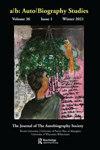在课堂上采访冥想
Q1 Arts and Humanities
引用次数: 0
摘要
本文章由计算机程序翻译,如有差异,请以英文原文为准。
Interview Mediations in the Classroom
How should we use interviews in the classroom? The question perhaps initially sounds bland or irrelevant to many. It is a question for colleagues working in oral history or journalism, or those working with archives or drawing on social science methodologies. In fact, as I want to suggest here, posing this apparently simple, normative question—How “should” (not “do”) we use interviews?—challenges scholars of life writing to consider the ways in which we mediate knowledge to our students. The interview—conversation for the purposes of publication, however loosely defined—is a particularly suggestive case study in this regard. We live, as various scholars have noted, in an “interview society.”1 Interviews pervade contemporary culture, and scholars deploy them across a range of disciplines and sectors. As a method of data collection, they have become ubiquitous in the social sciences, medicine, and the law. As a form, they have proven extremely popular with journalists, readers, editors, and even critics. This prevalence is matched by a heterogeneity in the norms that shape their use across different disciplines. Should the subject remain anonymous or receive authorial recognition? Should the transcript remain sacrosanct or is it raw material to be edited? Does value inhere in the process or the product? Those colleagues mentioned above might have very different answers. For life writers contemplating the pedagogical import of working in an interdisciplinary field, the interview offers a familiar yet tricky example. But the interview is also suggestive in another way. Despite their prevalence, interviews are often sidelined within life writing. This is despite our keenness to catalogue and analyze forms: autobiography, diary, personal essay, letter, blog, graphic memoir—the list goes on. The interview is life writing’s forgotten form. Why? It is likely that their suspicious associations with gossip and—perhaps worse—data do not help in a field with strong ties to literary studies, a discipline long riven by hierarchical debates around genre and literary value and, since the late twentieth century, anxieties around its position in relation to the sciences. Similarly, with its structural reliance on collaboration and https://doi.org/10.1080/08989575.2022.2154445
求助全文
通过发布文献求助,成功后即可免费获取论文全文。
去求助
来源期刊

a/b: Auto/Biography Studies
Arts and Humanities-Literature and Literary Theory
CiteScore
0.80
自引率
0.00%
发文量
27
期刊介绍:
a /b: Auto/Biography Studies enjoys an international reputation for publishing the highest level of peer-reviewed scholarship in the fields of autobiography, biography, life narrative, and identity studies. a/b draws from a diverse community of global scholars to publish essays that further the scholarly discourse on historic and contemporary auto/biographical narratives. For over thirty years, the journal has pushed ongoing conversations in the field in new directions and charted an innovative path into interdisciplinary and multimodal narrative analysis. The journal accepts submissions of scholarly essays, review essays, and book reviews of critical and theoretical texts as well as proposals for special issues and essay clusters. Submissions are subject to initial appraisal by the editors, and, if found suitable for further consideration, to independent, anonymous peer review.
 求助内容:
求助内容: 应助结果提醒方式:
应助结果提醒方式:


